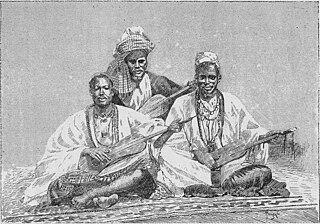Related Research Articles

Musa I was the ninth mansa of the Mali Empire, which reached its territorial peak during his reign. Musa is known for his wealth and generosity. He has been subject to popular claims that he is the wealthiest person in history, but his actual wealth is not known with any certainty. His riches came from the mining of significant gold and salt deposits in the Mali Empire, along with the slave and ivory trade.

The Mali Empire was an empire in West Africa from c. 1226 to 1670. The empire was founded by Sundiata Keita and became renowned for the wealth of its rulers, especially Mansa Musa. The Manding languages were spoken in the empire. At its peak, Mali was the largest empire in West Africa, widely influencing the culture of the region through the spread of its language, laws and customs. Much of the recorded information about the Mali Empire comes from 14th-century Tunisian historian Ibn Khaldun, 14th-century Moroccan traveller Ibn Battuta and 16th-century Andalusian traveller Leo Africanus. The other major source of information is Mandinka oral tradition, as recorded by storytellers known as griots.
Sundiata Keita was a prince and founder of the Mali Empire. He is also the great-uncle of the Malian ruler Mansa Musa, known for being the wealthiest person of all time.
Khalifa was a 13th-century Mansa of the Mali Empire mentioned by the medieval Arab scholar Ibn Khaldun. All that is known of Khalifa's life comes from a brief mention in Ibn Khaldun's Kitāb al-ʻIbar:
[Mārī Jāṭa] ruled for 25 years, according to what they relate, and when he died his son Mansā Walī ruled after him...His brother Wātī ruled after him and then a third brother, Khalīfa. Khalīfa was insane and devoted to archery and used to shoot arrows at his people and kill them wantonly so they rose against him and killed him. He was succeeded by a sibṭ [son of a daughter] of Mārī Jāṭa, called Abū Bakr, who was the son of his daughter.
Sakura was a mansa of the Mali Empire who reigned during the late 13th century, known primarily from an account given by Ibn Khaldun in his Kitāb al-ʻIbar. Sakura was not a member of the ruling Keita dynasty, and may have been formerly enslaved. He usurped the throne following a period of political instability and led Mali to considerable territorial expansion. During his reign, trade between the Mali Empire and the rest of the Muslim world increased. He was killed in the early 1300s while returning from the hajj and the Keita dynasty was restored to power.
Sunjata [] is an epic poem of the Malinke people that tells the story of the hero Sundiata Keita, the founder of the Mali Empire. The epic is an instance of oral tradition, going back to the 13th century and narrated by generations of griot poets or jeliw (djeli). There is no single or authoritative version. Material pertaining to the epic first began to be collected during the early 20th century in French Sudan, notably by the French elite school École William Ponty, resulting in the "modern" version of the tale as considered standard today, as published in "novelistic" form in French translation by Djibril Tamsir Niane in 1960.
Chief Sir Ernest Emenyonu is a Nigerian academic, who is an African literature critic and professor. He was formerly head of the department of English and Literary Studies, Dean of the Faculty of Arts, and Deputy Vice-Chancellor of the University of Calabar, in that order, through the 1980s and 1990s. He was also Provost of Alvan Ikoku College of Education now Alvan Ikoku Federal College of Educationˌ Owerri in Imo stateˌ Nigeria (1992–1995).
Swahili literature is, generally speaking, literature written in the Swahili language, particularly by Swahili people of the East African coast and the neighboring islands. It may also refer to literature written by people who write in the Swahili language. It is an offshoot of the Bantu culture.

Lars Michael Clausen was a German sociologist and professor at the University of Kiel.
Rainer Polak is an ethnomusicologist and djembe drummer who has researched in the field of West African celebration music performances and written in the field of ethnomusicology.
Gerhard Stapelfeldt is a German sociologist. He was a university teacher at University of Hamburg until December 2010.

Circa 1230s-1600s, the MaliEmpire was created in Western Africa along the Niger River. Often associated with being founded by Sunjata Keita, the history of Mali is extremely based on oral history. The story of the founder of Mali, Sunjata Keita, is largely based on oral history. Oral history may be defined as the preservation and interpretation of historical, cultural or personal experiences by way of a speaker. In Mali, such a speaker can be described as a poet, a storyteller, a praise singer or a musician. A large amount of Mali's history is transferred via oral historians. Such oral historians in Mali are known as griots, Jalis, and Jelis. The origins of oral history in Mali may be traced back to the story of Sunjata Keita. Modern-day oral history in Mali has transformed from the history based griots to a more contemporary musical and negotiator based griots. The current state of oral history in Mali has travelled to other realms like popular culture and politics.
Maximilien Quenum-Possy-Berry, Légion d'honneur was a politician who served as a Senator of the Fourth Republic, representing Dahomey in the French Senate from 1955 to 1958. He was also a teacher of philosophy and a writer on ethnology.

Harm Klueting is a German historian, theologian, university professor and a Roman Catholic priest converted from Lutheranism. His research focuses on church history and general history of the early modern period. But he also has books on the history of Westphalia presented.

Ronald P. Schaefer, also known as Ron Schaefer is an American academic, English professor, and linguist. He is the first person "to devise a written version of a language called Emai", a language reported in 1997 to be spoken by about 30,000 Emai people in Edo State of Nigeria. He has been described as one with "fevered intellect, the sharp chin, the untamable kineticism."

Robert Schneider is an Austrian writer, who published novels including Schlafes Bruder, texts for the theatre, and poetry. His works have been translated to many languages. Schlafes Bruder became the basis of a film, a ballet, an opera and several plays, and received international awards. Schneider withdrew from writing in 2007.
Alessandro Bausi is an Italian philologist working on Ethiopic texts and manuscripts. Bausi earned his PhD in 1992 from University of Naples "L'Orientale". Formerly Assistant (1995) and Associate Professor (2002) of Ethiopic Language and Literature at the University of Naples "L'Orientale", since 2009 he is Professor for Ethiopian Studies at the Asien-Afrika-Institut and Director of the Hiob Ludolf Centre at Universität Hamburg. He is considered as one of the leading scholars in his field, and is the editor of the journal Aethiopica: International Journal of Ethiopian and Eritrean Studies and of the series Aethiopistische Forschungen.
Ernst Karl Alwin Hans Dammann was a German Africanist. With Walter Markov, he was one of the founders of African Studies in the DDR, and as a student of Carl Meinhof and the successor of Diedrich Hermann Westermann, was part of the "second wave" of German Africanists. A prodigious scholar of African languages and a one-time missionary in Tanga, Tanzania, he was an early member of the Nazi party, and his scientific work was criticized as imbued with racist ideology.

Albrecht Fuess is a German scholar of Islam and the history of the medieval Eastern Mediterranean. He is the professor of Islamic Studies at University of Marburg.
Motisar is an Indian community from Rajasthan and Gujarat known for folk-poetry. They were well respected & patronised by the Charans.
References
- ↑ Editorial Board History in Africa, 2014. Retrieved 16 May 2014.
- ↑ Jan Jansen African Studies Centre Leiden, 2014. Retrieved 17 May 2014. Archived here.